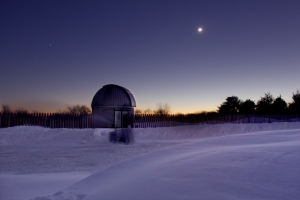
Stargazing Night
- Where:
- Frosty Drew Observatory
- When:
- Friday February 19, 2016 at 6:00 p.m.
- Cost:
- $1 Suggested Donation per Person
Tonight is Stargazing Night at Frosty Drew Observatory and yet again, we are expecting unfavorable weather conditions. Clouds will continue to increase as the day progresses, with skies becoming fully overcast after sunset. Rain and possibly light snow will set in overnight, becoming all rain before dawn. Tonight's 92% waxing gibbous Moon will be overhead for most of the night and would have brightly obscured most deep sky objects while offering up stunning views of the near full lunar surface.
We will open the Observatory and Sky Theatre at 6:00 p.m. In the Sky Theatre we will feature a showcase of celestial objects photographed at Frosty Drew with a commentary and open discussion on general astronomy. The Observatory will be open for tours of our equipment and operations. If you ever wondered how everything works at Frosty Drew, tonight will offer you a chance to find out with the lights on. We will stay open until 9:00 p.m.
Overall, tonight is another cloud attack. Though our telescopes can view light from billions of light years distant, the clouds can shut it all down. These are the nights when we geek out in the Sky Theatre and talk about all the amazing things happening in the cosmos. Have questions about the recent gravitational wave discovery, how about the evidence for Planet Nine, or maybe you're not up to speed on what happened to Pluto. Well tonight is the night to get answers to your questions! So take a break from your daily gig and stop in for a quick astro-fix and offer up some hope with us for imminent clear skies and stunning starscapes.
-------------------------------------------------------------------------
Weekly Happenings
Scott MacNeill
Over the weekend, the last three night-time International Space Station (ISS) passes will happen over New England for the winter season, with Saturday evening bringing an amazing view! We see the ISS pass over in the evening or early morning sky due to its 92 minute Earth orbital period at 17,100 mph on a 51.6° inclination to Earth's equator at an average altitude of 250 miles. Because of these orbital dynamics and the fact that all we see is sunlight reflecting off the station, the ISS is only visible during short periods, with corresponding periods of no visibility. Step out this weekend and catch the last winter 2016 sights of humanity's only continuously inhabited residence in the space:
Friday (Feb 19): 6:51 p.m., starting in WNW, rising to 28° SW
Saturday (Feb 20): 5:59 p.m., starting in WNW, rising almost overhead. This will be a super bright pass!
Sunday: (Feb 21): 6:44 p.m., starting in WSW, rising to 12° SW
Get updates on passes of the ISS over New England on the Frosty Drew Observatory page or for any location at NASAs Spot the Station.
Check out this awesome time-lapse video of the James Webb Space Telescope (JWST) mirror assembly. The JWST will have a primary mirror measuring 21.3 feet in diameter and is comprised of 18 hexagonal mirror segments, each measuring about 4.3 feet in diameter. JWST is hailed as the successor to the amazing Hubble Space Telescope and is slatted for launch in 2018. Check out the video, then stamp “AWESOME” on your 2018 calendar and gear up for images and discoveries bound to break the internet.
The nefarious Friday night weather of late is hardcore for those sweating a much needed astro-fix. Though Friday nights aren't your only source of astro geekage in Rhode Island as Frosty Drew is among four observatories in the state offering up free astro-fixes. Starting on Tuesday nights, astro-beans abound at Ladd Observatory in Providence, RI. Wednesday nights bring a quick bump compliments of the Margaret M. Jacoby Observatory at the CCRI Knight campus in Warwick, RI. Snag an end-of-the-week, Saturday night astro-boost at Seagrave Observatory in N. Scituate, RI. Four chances at clearer skies are always better than one and certainly a requirement for those fixed on catching New England starscapes on a weekly basis.
-Scott

